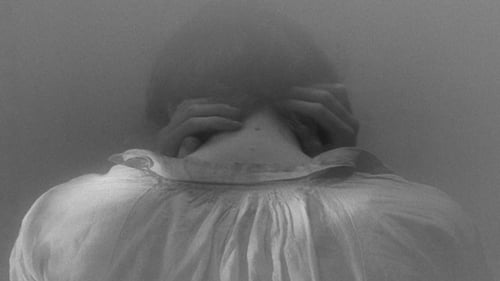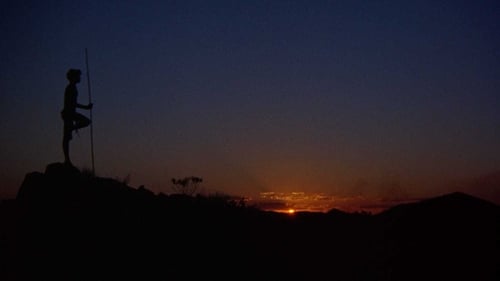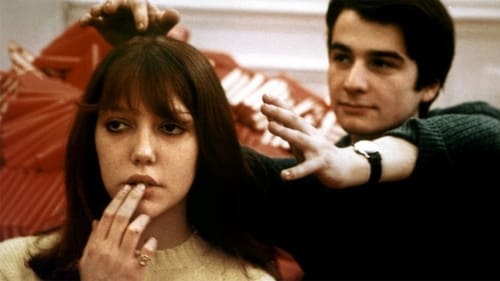Karlheinz Stockhausen
출생 : 1928-08-22, Mödrath, Kerpen, Germany
사망 : 2007-12-05
약력
Karlheinz Stockhausen was a German composer, acknowledged by critics as one of the most important but also controversial composers of the 20th and early 21st centuries. He is most known for his groundbreaking work in electronic music, aleatory (controlled chance) in serial composition, and musical spatialization.

Self - Composer (archive footage)
The amazing story of electronic music: its epic journey from its origins in Europe, at the hands of the great artists of the post-war classical avant-garde, to the great post-industrial cities of the USA, where this genre of genres took over music stores, shady clubs and, eventually, the big stages.

Music
How can a DSLR camera move in the ruins of a 19th century mansion that is battered to be covered with glass and steel in the days to come, for that’s a more appropriate image as a shopping mall. How to get up and to do what in the ruins; the scenery of late ones to come? Here, this occurs: there are holes in some walls releasing specters to haunt which that makes impossible to reach. What is an Istanbul, where is Aleppo.

Himself
One morning, the late Karlheinz Stockhausen awoke from a dream that told him to take to the sky. Stockhausen envisioned four helicopters swirling in the clouds, with each of a quartet’s members tucked inside his own chopper, communicating through headsets, stringing away in sync to the rotor-blade motors. He immediately set forth to make that dream a reality. In 1995, Dutch film director Scheffer followed Stockhausen in the days leading up to the premiere performance of his Helicopter String Quartet in Amsterdam. The resulting film offers a rare glimpse of Stockhausen as he patiently dictates every agonizingly detailed measure to the Arditti Quartet.

Musical
One morning, the late Karlheinz Stockhausen awoke from a dream that told him to take to the sky. Stockhausen envisioned four helicopters swirling in the clouds, with each of a quartet’s members tucked inside his own chopper, communicating through headsets, stringing away in sync to the rotor-blade motors. He immediately set forth to make that dream a reality. In 1995, Dutch film director Scheffer followed Stockhausen in the days leading up to the premiere performance of his Helicopter String Quartet in Amsterdam. The resulting film offers a rare glimpse of Stockhausen as he patiently dictates every agonizingly detailed measure to the Arditti Quartet.

Producer
아방가르드 작곡가 칼하인츠 슈톡하우젠이 영화 사운드트랙을 담당했다. 흑백에 컬러가 부분적으로 구현된 영화는 시네마스코프용으로 제작되었다. 실사와 애니메이션을 결합하고, 빛을 활용해 방 안에서 홀로 편지를 쓰는 한 여인의 내면을 형상화한다. 연필심은 자꾸 부러지고 여인은 계속해서 편지를 쓰는데, 여인의 감정에 따라 창문 밖에 보이는 빛의 풍경이 변화한다. 이 영화는 정신병원에서 줄곧 남편에게 편지를 썼던 엠마 호크에게 헌정하는 것이다. BBC와 파이프라인 필름스의 단편 음악영화 시리즈 ‘사운드 온 필름 인터내셔널 Sound on Film International’의 일환으로 코닝크스튜디오의 키스 그리피스가 제작했다.

Male voice
아방가르드 작곡가 칼하인츠 슈톡하우젠이 영화 사운드트랙을 담당했다. 흑백에 컬러가 부분적으로 구현된 영화는 시네마스코프용으로 제작되었다. 실사와 애니메이션을 결합하고, 빛을 활용해 방 안에서 홀로 편지를 쓰는 한 여인의 내면을 형상화한다. 연필심은 자꾸 부러지고 여인은 계속해서 편지를 쓰는데, 여인의 감정에 따라 창문 밖에 보이는 빛의 풍경이 변화한다. 이 영화는 정신병원에서 줄곧 남편에게 편지를 썼던 엠마 호크에게 헌정하는 것이다. BBC와 파이프라인 필름스의 단편 음악영화 시리즈 ‘사운드 온 필름 인터내셔널 Sound on Film International’의 일환으로 코닝크스튜디오의 키스 그리피스가 제작했다.

Music
아방가르드 작곡가 칼하인츠 슈톡하우젠이 영화 사운드트랙을 담당했다. 흑백에 컬러가 부분적으로 구현된 영화는 시네마스코프용으로 제작되었다. 실사와 애니메이션을 결합하고, 빛을 활용해 방 안에서 홀로 편지를 쓰는 한 여인의 내면을 형상화한다. 연필심은 자꾸 부러지고 여인은 계속해서 편지를 쓰는데, 여인의 감정에 따라 창문 밖에 보이는 빛의 풍경이 변화한다. 이 영화는 정신병원에서 줄곧 남편에게 편지를 썼던 엠마 호크에게 헌정하는 것이다. BBC와 파이프라인 필름스의 단편 음악영화 시리즈 ‘사운드 온 필름 인터내셔널 Sound on Film International’의 일환으로 코닝크스튜디오의 키스 그리피스가 제작했다.

Self
Less a documentary than a primer on all electronic music. Featuring interviews with nearly every major player past and present, as well as a few energetic live clips, Modulations delves into one of electronica's forgotten facets: the human element. Lee travels the globe from the American Midwest to Europe to Japan to try to express the appeal of music often dismissed as soulless. Modulations shows that behind even the most foreign or alien electronic composition lies a real human being, and Lee lets many of these Frankenstein-like creators express and expound upon their personal philosophies and tech-heavy theories. Lee understands that a cultural movement as massive and diverse as dance music can't be contained.

For the past ten years Zappa in composing has turned away from Rock and Roll music - for which he first became famous - and has been working on new, contemporary, orchestral electronic music; in solitude and beyond any commercial conventions or commitments. It is the first time that Zappa has allowed a film crew to study him during compositional work, actually filming the first moments of a new compositional process. By contrast, in a staged interview Zappa gives comments on music. This film seeks to reveal the sensetivities of Zappa's personality and character also beyond narrative content.

Self
In his book "1984", George Orwell saw the television of the future as a control instrument in the hands of Big Brother. Right at the start of the much-anticipated Orwellian year, Paik and Co. were keen to demonstrate satellite TV's ability to serve positive ends-- Namely, the intercontinental exchange of culture, combining both highbrow and entertainment elements. A live broadcast shared between WNET TV in New York and the Centre Pompidou in Paris, linked up with broadcasters in Germany and South Korea, reached a worldwide audience of over 10 or even 25 million (including the later repeat transmissions).

As self

Additional Music
평화롭고 화목한 가정의 아버지와 맏딸, 막내 아들이 호주의 아웃백으로 여행을 떠난다. 내륙 사막의 한 가운데 차를 세운 후 딸은 차에서 조금 떨어진 곳에 보자기를 깔고 간소하지만 정성이 담긴 점심 식사를 차리기 시작한다. 점심 준비가 끝나갈 때쯤, 우울증이나 정신분열증을 앓고 있는 듯한 아버지가 천진하게 소풍을 즐기고 있는 자신의 두 자녀에게 무자비하고 광기 어린 총알을 퍼붓기 시작한다. 영민하고 민첩한 딸은 이 처참하고 난해한 상황에도 당황하지 않고 어린 남동생과 함께 근처에 있는 바위 뒤로 몸을 숨긴다. 도시와 문명으로부터 멀리 떨어진 외진 사막에서 벌어지는 이 부조리한 비극은 결국 자녀들을 죽이지 못한 아버지의 자살로 끝난다. 사막에서 벗어날 수 있는 유일한 방법인 자동차는 아버지가 자녀들이 달아나지 못하도록 기름을 끼얹고 불을 질러 이미 화염에 휩싸여 있다. 막 사춘기를 넘은 어린 소녀와 아버지의 행동을 전혀 이해하지 못하고 자동차 놀이에 여념이 없는 꼬마는 이제부터 펼쳐질 드넓은 아웃백에서의 생존 게임을 이겨내야만 한다.

Original Music Composer
1967년 파리, 다섯 명의 대학생들이 여름방학을 이용해 친구의 집에 모여 공동생활을 시작한다. 이들은 마오주의 등 급진적인 주제를 다룬 정치 서적을 읽고 토론을 나눈다.

Music
Filmed during rehearsals for the premiere of Stockhausen's monumental work Momente. The revealing rehearsal sequences are interspersed with Stockhausen speaking of his youth, work process and the genesis and meaning of Momente.

Himself
Filmed during rehearsals for the premiere of Stockhausen's monumental work Momente. The revealing rehearsal sequences are interspersed with Stockhausen speaking of his youth, work process and the genesis and meaning of Momente.

Studio recording of Mikrophonie I with the Stockhausen-Ensemble. Short introduction by Stockhausen in French and German.

Music
Studio recording of Mikrophonie I with the Stockhausen-Ensemble. Short introduction by Stockhausen in French and German.

Music
This fascinating film documents the U.S. premiere production of Originale, a Happening by German composer Karlheinz Stockhausen. Filmed at the "2nd Annual Avant Garde Festival of New York," which was produced by Norman Seaman and Charlotte Moorman, the stage production was directed by Allan Kaprow. Performers include Nam June Paik, Moorman, Jackson Mac Low and Allen Ginsberg, among many others.

This fascinating film documents the U.S. premiere production of Originale, a Happening by German composer Karlheinz Stockhausen. Filmed at the "2nd Annual Avant Garde Festival of New York," which was produced by Norman Seaman and Charlotte Moorman, the stage production was directed by Allan Kaprow. Performers include Nam June Paik, Moorman, Jackson Mac Low and Allen Ginsberg, among many others.

Karlheinz Stockhausen (22 August 1928 – 5 December 2007) was a German composer, widely acknowledged by critics as one of the most important but also controversial composers of the 20th and early 21st centuries. Another critic calls him "one of the great visionaries of 20th-century music". He is known for his ground-breaking work in electronic music, aleatory (controlled chance) in serial composition, and musical spatialization. February 13th 1972 at the Institute of Contemporary Arts, London. Excerpts from KONTRA-PUNKTE, GRUPPEN, GESANG DER JÜNGLINGE, ZEITMAßZE,
ZYKLUS, KREUZSPIEL, MANTRA, CARRÉ






